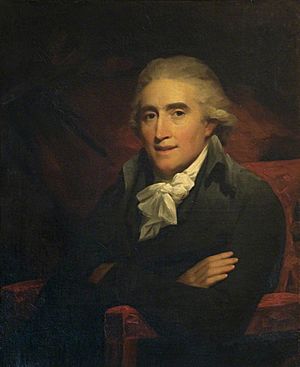Henry Erskine (lawyer) facts for kids
Quick facts for kids
Henry Erskine
|
|
|---|---|

The Hon Henry Erskine by Henry Raeburn
|
|
| Lord Advocate | |
| In office 1783–1783 |
|
| Monarch | George III |
| Prime Minister | The Duke of Portland |
| Preceded by | Henry Dundas |
| Succeeded by | Ilay Campbell |
| In office 1806–1807 |
|
| Monarch | George III |
| Prime Minister | The Lord Grenville |
| Preceded by | Sir James Montgomery, Bt |
| Succeeded by | Archibald Colquhoun |
| Personal details | |
| Born | 1 November 1746 |
| Died | October 8, 1817 (aged 70) |
| Nationality | British |
| Spouses | (1) Christian Fullerton (d. 1804) (2) Erskine Munro |
| Alma mater | St Andrews University University of Edinburgh University of Glasgow |
The Honourable Henry "Harry" Erskine (born November 1, 1746 – died October 8, 1817) was a very important British Whig politician and lawyer. He was known for his amazing speaking skills and for helping to shape how legal cases are handled today.
Contents
Early Life and Education
Henry Erskine was born in 1746. He was the second surviving son of Henry Erskine, the 10th Earl of Buchan. His brother, Thomas Erskine, also became a very famous lawyer and politician.
Henry went to several top universities. He studied at the University of St Andrews from 1760 to 1764. After that, he attended the University of Glasgow from 1764 to 1766. Finally, he went to the University of Edinburgh in 1766. People described him as tall and slender. He had a lively face, a clear voice, and a very elegant manner.
A Brilliant Lawyer and Speaker
Henry Erskine was known as a brilliant lawyer. Many people believe he helped create the modern way trials work. This is called the "adversarial system." In this system, two sides present their arguments to a judge or jury. His friends compared his speaking skills to Cicero, a famous Roman orator.
Serving as Lord Advocate
Erskine served as the Lord Advocate twice. The Lord Advocate is like the chief legal officer for Scotland. His first term was from 1783 to 1784. He served again from 1806 to 1807. During these times, he worked under King George III. He also advised the Prince of Wales in Scotland starting in 1783.
Dean of the Faculty of Advocates
From 1785 to 1795, Erskine was the Dean of the Faculty of Advocates. This was a very important position for lawyers in Scotland. However, he was not re-elected in 1796. This was because he disagreed with the war happening at the time. A famous poet, Robert Burns, even wrote a poem about this vote.
Henry Erskine was known for helping those in need. People said that "no poor man wanted a friend while Harry Erskine lived." He retired from his legal work in 1811. He moved to his country home called Almondell. He also wrote poems, including one called The Emigrant, an Eclogue in 1773.
Political Career
Besides his legal work, Henry Erskine was also a Member of Parliament. He represented Haddington Burghs for a short time in 1806. Then, he represented Dumfries Burghs from 1806 to 1807. In 1808, he was appointed to a special group. This group looked into how justice was managed in Scotland.
Family Life
Henry Erskine married his first wife, Christian Fullerton, in 1772. They had two sons and two daughters. Their oldest son, Henry, later became the 12th Earl of Buchan. Christian passed away in 1804.
In 1805, Erskine married his second wife, Erskine Munro. This marriage did not have any children. Henry Erskine died in October 1817 when he was 70 years old. A statue of him by Peter Turnerelli stands in Parliament Hall in Edinburgh.
 | Audre Lorde |
 | John Berry Meachum |
 | Ferdinand Lee Barnett |

